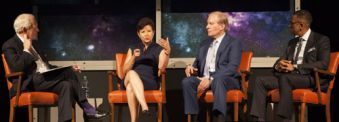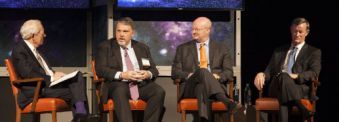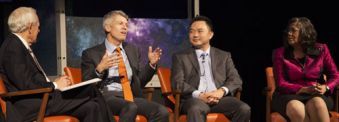Main page content
Leaders in national security, health care and education convene in Austin to discuss how the UT System can address global challenges
AUSTIN — The Chancellor’s Council 49th Annual Meeting & Symposium May 6 drew more than 1,000 of UT’s philanthropists to hear how The University of Texas System and its institutions are poised to tackle the most vexing problems of this generation.
The theme for this year’s event: “If there’s a global challenge, there’s a Texas solution”
UT leaders, alumni, faculty and partners – representing some of the greatest minds and innovators in the nation – delved into engaging discussions that homed in on three “Quantum Leaps” identified by Chancellor William H. McRaven as part of his vision for the UT System.
Attendees learned how the UT System is engaging in unprecedented collaborations and leveraging the collective brainpower and resources of its 14 institutions to:
- Expand the education pipeline to bridge the economic divide
- Elevate higher education’s role in responding to national security threats
- Reimagine medical education and health care delivery
Bob Schieffer, a native Texan and legendary journalist who has interviewed every president since Richard Nixon, moderated the discussions.
The Symposium kicked off with an address by Chancellor McRaven who highlighted the extraordinary contributions of UT institutions and the UT System’s bold vision for improving lives in Texas and across the globe.
“There is no other institution with the talent, strength and reach of the UT System,” McRaven told Chancellor’s Council members. “In some ways, the future of Texas is in our hands.”
Bridging the Economic Divide
From left, Schieffer, Tucker, Hunt and Golston
Three accomplished nonprofit and business leaders discussed how increasing the number of children who have access to a college degree is critical to the social and economic success of individuals, the state of Texas and the entire nation.
“Investing in a child’s education is not charity,” said UT System Regent Sara Martinez Tucker, who also served as Under Secretary at the U.S. Department of Education. “It is investing in the future of our country.”
Martinez Tucker recalled her childhood in Laredo and how going back home after graduating from UT affected her—realizing that for many children growing up in her hometown, a college education seemed unattainable. Providing a path to a college degree and ensuring the American dream is attainable for every child should be a priority for everyone, she said.
Allan Golston, president of the United States Program at the Bill & Melinda Gates Foundation said UT System’s efforts represent unprecedented levels of engagement and collaboration between higher education and pre-K through 12.
“One of the reasons we love and invest in Texas is because there is a lot of innovation,” Golston said.
And Woody Hunt, executive chairman of Hunt Companies, Inc., and former chairman of the Texas Higher Education Coordinating Board’s Strategic Planning Committee, explained the reasoning behind THECB’s target by 2030, 60 percent of Texans ages 25-34 will have a postsecondary credential or degree.
“By 2020, 65 percent of all new jobs will require some type of secondary attainment,” Hunt said. “We’re at 38.3 percent as of 2015. We want a prosperous competitive, economy, one that can produce a high-performing education system both postsecondary and K-12.”
Watch the full panel discussion.
National Security takes the Higher (Education) Road
From left, Schieffer, Rasmussen, Inboden and McRaven
Three experts in policy and counterterrorism efforts at a national level talked about why higher education – and specifically the UT System – can and should take a more prominent role in addressing the ever-changing and more complex threats to our nation’s safety. All agreed that collaboration is key.
“We’re trying to broaden our engagement,” said Nick Rasmussen, director of the National Counterterrorism Center, the primary organization in the U.S. government responsible for integrating and analyzing all intelligence pertaining to terrorism.
As a scholar with one foot in the world of academia and another in government, William Inboden, Ph.D., said he feels a responsibility to make sure national security experts are taking full advantage of the rich resources universities have to offer. He was previously senior director for strategic planning on the White House’s National Security Council and now is executive director of UT Austin’s Clements Center for National Security.
“The policy world and the academic world speak different languages,” Inboden said. “I want to help bridge that gap.”
UT System’s own Chancellor McRaven rounded out the panel. McRaven, a retired four-star Navy admiral and former commander of U.S. Special Operations Command, is a bona fide national hero—a Navy SEAL who is best remembered as the architect of the raid that led to the killing of Osama Bin Laden.
He noted that numerous national security leaders, including the secretary of defense, the director of national intelligence and the director of the CIA, have recently visited the Clements Center.
“They have come here because they recognize that something is going on here (in Texas),” McRaven said. “We have this opportunity to bring academia and national security expertise and professionals together in a venue that hasn’t been there before.”
Watch the full panel discussion.
Health Care that Works
From left, Schieffer, Johnston, Vo and Dyer
Visionary health care leaders at UT System institutions discussed innovative and powerful initiatives that have the potential to revolutionize medical education and change the way health care is delivered in the 21st Century.
Clay Johnston, M.D., Ph.D., founding dean of UT Austin’s Dell Medical School, talked about how health care is stymied by a culture that doesn’t lend itself to innovation, pointing even to the lowly hospital gown as an example. At UT Austin’s Dell Medical School, which welcomes its very first students this summer, building a medical school from the ground up provides a phenomenal opportunity to disrupt health care and take a brand new approach to training tomorrow’s health care providers.
“If we just did it like everybody else – there are fabulous schools here already – but if we were to just follow that model, we would be wasting this opportunity,” Johnston said. “We have to ask the question, what’s wrong with our health care system? How can we organize a medical school to be better aligned with society’s desires for health? If we start with that as a fundamental precept for what we’re doing, everything else follows from that.”
Alexander Vo, Ph.D., vice president of telemedicine and health services technology at UT Medical Branch discussed UT Medical Branch’s tremendous advances in developing innovative care delivery models in the field of telemedicine. Telemedicine is particularly important in Texas, which has a high number of rural communities with limited access to specialty care.
“Telemedicine is simply leveraging telecommunications technology to provide care at a distance,” Vo said. “Most of the specialists in Texas live in four metropolitan areas. That leaves a lot of patients in rural areas not connected to specialists. We use telecommunications technology to bridge that geographical barrier.”
And Carmel Dyer, M.D., executive director of UTHealth Houston’s Consortium on Aging, provided fascinating insight into the world of geriatric and palliative medicine, underscoring the importance of having doctors trained to care for older patients.
“Our physiology changes when we’re about 75 years of age,” she said. “You wouldn’t want your child or your grandchild treated by someone who wasn’t an expert in pediatrics.”
At UTHealth, Dyer is leading an effort to meet the challenge of providing quality health care for a growing elderly population by developing a hospital specifically designed to serve them.
“What we intend to do is to take the UTHealth model in Houston, refine it and export it to make Texas a healthier place to grow old," Dyer said.
Watch the full panel discussion.
For more information, visit the Chancellor’s Council Annual Meeting webpage.
About The University of Texas System
Educating students, providing care for patients, conducting groundbreaking basic, applied and clinical research, and serving the needs of Texans and the nation for more than 130 years, The University of Texas System is one of the largest public university systems in the United States. With 14 institutions and an enrollment of more than 217,000, the UT System confers more than one-third of the state’s undergraduate degrees, educates almost two-thirds of the state’s health care professionals annually and accounts for almost 70 percent of all research funds awarded to public institutions in Texas. The UT System has an annual operating budget of $16.9 billion (FY 2016) including $3 billion in sponsored programs funded by federal, state, local and private sources. With about 20,000 faculty – including Nobel laureates – and more than 70,000 health care professionals, researchers, student advisors and support staff, the UT System is one of the largest employers in the state.
News Contact Information
Jenny LaCoste-Caputo: jcaputo@utsystem.edu • 512-499-4361(direct) • 512-574-5777 (cell)
Karen Adler: kadler@utsystem.edu • 512-499-4360 (direct) • 210-912-8055 (cell)




